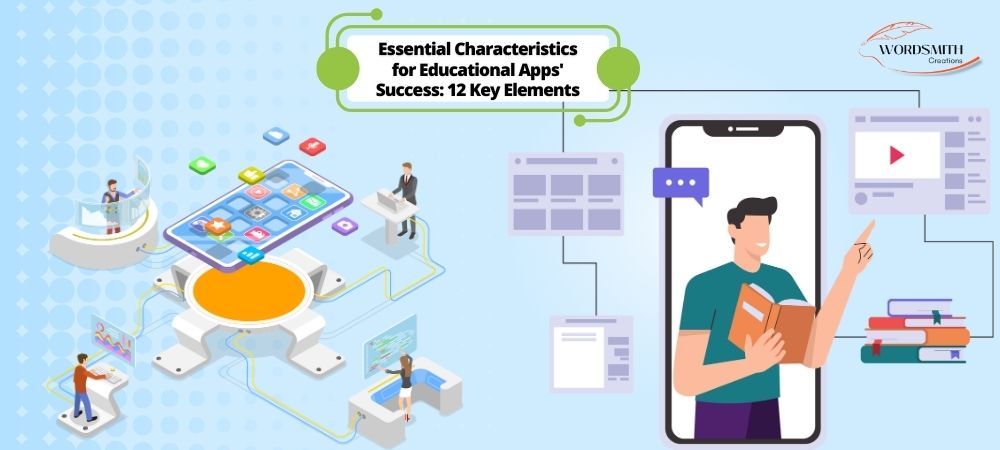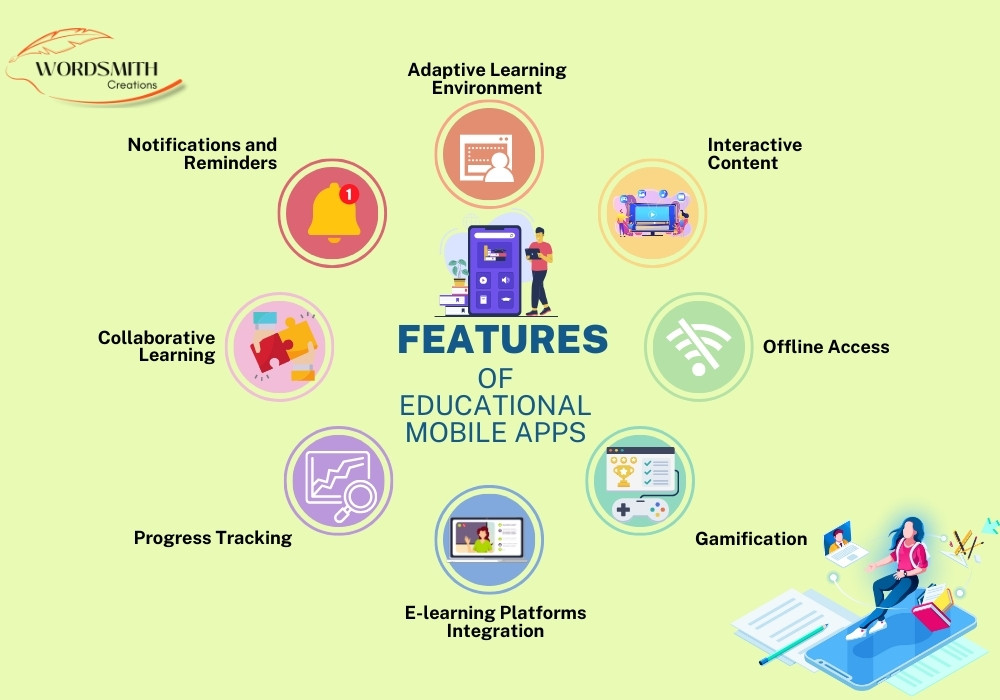
Introduction to the Future of Educational Apps
In the swiftly changing landscape of education, the introduction of mobile learning has brought about a significant transformation. E-learning platforms have arisen as formidable assets, providing students with a wealth of resources readily accessible. The effectiveness of these platforms relies on various elements, such as a flawless user experience (UX), adherence to app design principles, and the incorporation of cutting-edge educational technology. Interactive learning has taken center stage, with educational apps focusing on enhancing student engagement and seamlessly integrating the curriculum. Personalized learning paths tailored to individual needs, coupled with effective feedback mechanisms, ensure that learners receive a bespoke educational experience. As we delve deeper into the characteristics and key elements that make an educational app essential, it's evident that the best practices in app development prioritize student-centric features.
In 2023, the best educational apps stand out not just for their content but also for their design and functionality. The importance of user experience in educational apps cannot be overstated, as it plays a pivotal role in determining their success. From understanding what makes an educational app successful to recognizing the top features of learning apps, it's clear that the future of education is digital. As we explore how to design an effective educational app, we'll also touch upon the benefits of interactive learning tools and the significance of feedback and assessment in shaping a student's learning journey.
The Importance of Educational Apps in Mobile Learning
In the modern age, educational apps have transformed the manner in which students acquire knowledge. These e-learning platforms provide a combination of interactive learning tools and curriculum integration, ultimately enhancing the accessibility and engagement of education. One of the standout aspects of learning apps is their user experience (UX), which is carefully designed according to app principles to ensure smooth navigation and usability.
What makes an educational app successful? It's the perfect amalgamation of essential characteristics like student engagement, personalized learning paths, and feedback mechanisms. The best educational apps of 2023 prioritize enhancing student engagement through captivating content and interactive modules. Moreover, the importance of user experience in educational apps cannot be overstated, as it directly impacts the app's success and its ability to retain users.
Another key element is the integration of the curriculum in app design, ensuring that the content aligns with educational standards and objectives. Personalization in e-learning apps tailors the content to individual learner needs, offering a more targeted and effective learning experience. Furthermore, feedback and assessment in educational apps provide students with insights into their performance, helping them identify areas of improvement.
In conclusion, as educational technology continues to evolve, the significance of educational apps for students will only grow, setting new benchmarks for how we perceive and approach learning.
Read More Blog: What is a Framework in Programming? And Why You Should Use One
Benefits of Educational Apps
In the contemporary era of technology, educational applications have risen as influential instruments, fundamentally transforming the manner in which students acquire knowledge and engage with educational materials. These platforms have effectively incorporated technology into the educational journey, presenting a multitude of benefits:
E-learning Platforms for Mobile Learning: Educational apps provide a platform for mobile learning, allowing students to access educational content from anywhere, anytime. This flexibility ensures that learning is not confined to the four walls of a classroom.
- Enhanced User Experience (UX): A well-designed educational app focuses on providing an optimal user experience. The ease of navigation, intuitive design, and interactive elements ensure that students remain engaged and find the learning process enjoyable.
- Interactive Learning: With features like quizzes, video lessons, and interactive simulations, educational apps make learning dynamic and engaging. This interactive approach enhances comprehension and retention.
- Adherence to App Design Principles: Successful educational apps are built on solid app design principles. This ensures that the app is user-friendly, responsive, and provides a seamless experience across various devices.
- Harnessing Educational Technology: These apps leverage the latest in educational technology, from AR and VR to AI-driven personalized learning paths, enhancing the learning experience.
- Boosting Student Engagement: Features like gamification, rewards, and interactive content ensure that students remain motivated and engaged, leading to better learning outcomes.
- Curriculum Integration: One of the top features of learning apps is their ability to integrate the curriculum seamlessly. This ensures that the content is aligned with educational standards and complements classroom teaching.
- Feedback Mechanisms: Educational apps often come with built-in feedback mechanisms, allowing students to assess their progress. This immediate feedback helps students identify areas of improvement.
- Personalized Learning Paths: Leveraging AI and data analytics, many educational apps offer personalized learning paths. This means that the content is tailored to the individual needs and learning pace of the student, ensuring better comprehension.
- Characteristics of Success: The best educational apps of 2023 will be those that combine essential elements like interactivity, user-friendliness, and curriculum alignment to offer a comprehensive learning solution.
- Key Elements in App Development: Developing an effective educational app requires a focus on best practices, from ensuring the app's responsiveness to integrating the latest learning tools.
In conclusion, educational apps for students have transformed the landscape of education. Their success lies in their ability to combine the importance of user experience with interactive learning tools, ensuring that students not only learn but also enjoy the process. As technology continues to evolve, it's exciting to envision how these apps will further shape the future of education.

Features of Educational Mobile Apps
In the realm of digital learning, educational mobile apps have carved a niche for themselves, offering students a unique and flexible learning experience. These apps, tailored for mobile platforms, come with a range of features that cater to the diverse needs of learners. Here are some of the standout features:
- Adaptive Learning Environment: Educational apps often use algorithms to understand a student's learning pace and style. This allows the app to offer personalized content, ensuring that each student receives instruction tailored to their needs.
- Interactive Content: One of the primary reasons for the success of educational apps is their interactive content. From quizzes and puzzles to interactive videos, these apps make learning engaging and fun.
- Offline Access: Recognizing the varying internet accessibility across regions, many educational apps offer offline access. Students can download content and access it without an internet connection, ensuring uninterrupted learning.
- Gamification: To make learning more engaging, many apps incorporate game elements. This not only makes learning fun but also increases retention and understanding.
- E-learning Platforms Integration: Many educational apps integrate with e-learning platforms, allowing students to access a wider range of resources and tools from within the app.
- Progress Tracking: These apps often come with built-in tools that allow students and educators to track progress. This helps in identifying areas that need more attention.
- Collaborative Learning: Some apps offer features that allow students to collaborate on projects, discuss topics, and share resources, fostering a sense of community and collaborative learning.
- Notifications and Reminders: To keep students on track, these apps send out notifications and reminders about upcoming tests, assignments, or new content.
- Diverse Content Formats: From video lectures and e-books to podcasts and animated lessons, educational apps offer content in various formats to cater to different learning styles.
- Feedback and Assessment: Regular assessments and quizzes are a part of these apps, providing immediate feedback to students. This helps in reinforcing concepts and identifying areas of improvement.
- User-Friendly Interface: A successful educational app ensures a seamless user experience. The design is intuitive, making navigation easy even for younger students.
- Multilingual Support: To cater to a global audience, many apps offer content in multiple languages, ensuring that language is not a barrier to learning.
Incorporating the essence of mobile learning, educational apps for students have transformed the way education is delivered and consumed. Their success lies in their ability to offer a blend of traditional teaching methods with the advantages of modern technology, making learning accessible, flexible, and enjoyable.
How Wordsmith Creations Can Elevate Your App Development
Wordsmith Creations, with its expertise in mobile learning, is poised to revolutionize your app development process. Our team understands the nuances of e-learning platforms and is adept at integrating interactive learning tools to enhance user experience (UX). By adhering to the best app design principles, we ensure that your educational app stands out in terms of student engagement and curriculum integration. Our proficiency in educational technology allows us to implement personalized learning paths, ensuring a tailored experience for users. Moreover, our app development service incorporates feedback mechanisms, ensuring continuous improvement. Trust Wordsmith Creations to craft an educational app that resonates with students and embodies the key elements of success.
Frequently Asked Questions
-
What are E-learning platforms in mobile learning?
- E-learning platforms in mobile learning are digital environments accessible via smartphones or tablets, where students can access educational content and courses.
-
How does User Experience (UX) impact educational apps?
- A good UX ensures that students find the app intuitive, engaging, and user-friendly, enhancing their learning experience.
-
What is interactive learning in mobile apps?
- It involves dynamic content like quizzes, simulations, and interactive videos that promote active participation from students.
-
Why are app design principles essential for educational apps?
- They ensure the app is user-friendly, responsive, and provides a seamless experience, crucial for student engagement.
-
How does educational technology benefit students?
- It offers personalized learning paths, interactive content, and feedback mechanisms, enhancing comprehension and retention.
-
What makes an educational app successful?
- A combination of student engagement, curriculum integration, and leveraging the latest learning tools and best practices in app development.
-
Can you recommend app development services for educational apps?
- Yes, there are specialized app development services that focus on creating feature-rich, user-friendly educational apps tailored to students' needs.
Read More Blog: Conducting Ethnographic Research: An 8-Step Guide